时间、地点、让步、原因状语从句
状语从句

状语从句
7. 比较状语从句 比较状语从句表示某一动作或状态和另 一动作或状态在数量、性质或程度上的 比较,常用的连词有:as … as(和……一 样),not so … as(不如 …… ),than (比),the(more)…,the(more)… (越……越……)。
状语从句
[注 ] 比较状语中的名词或动词和主句中 注 的名词或动词完全一样时,为了避免重 复,常用one, that, those和do这类词来 代替重复的名词或动词,其中one只能用 来代替可数名词,其复数形式是ones; that可用来代替可数名词或不可数名词, 用作可数时其复数形式是those;do可以 代替整个谓语,也可以只代替谓语动词, 后面还可以有宾语。
状语从句
9. 让步状语从句 让步状语从句是一种表示退一步来讲的状语从 句,常用的连词有: although(= though)(虽然)as(尽管,虽 然)even if(= even though)(即使) however(= no matter how)(无论如何) whatever(= no matter what)(无论什么) whoever ( = no matter who ) ( 无 论 谁 ) whichever(= no matter which)(无论哪个) wherever(= no matter where)(无论何处) whenever(= no matter when)(无论何时)
状语从句
8. 方式状语从句 方式状语从句表示某一动作或状态发生时的行 为方式或状况,常用的连词有:as(如同,就 像),as if(as though)(似乎,好像), just as(正如,就像)。 [注 1] as通常表示真实的情况,而as if 和as 注 though则指非真实情况或假设性较大的情况。 [注2] according as, in proportion as(按照……) 注 所引起的从句,也叫方式状语从句。 so far as(就……说)所引起的从句,也可以看 作是方式的程度状语从句。
状语从句知识点详解(初中英语专项复习)14

状语从句知识点详解(初中英语专项复习)状语从句的概念: 用一个句子作状语来修饰动词和形容词,以表明动作发生或状态存在的时间、地点、原因等,这个句子就叫做状语从句。
状语从句的分类:状语从句共分为九大类,包括:时间、地点、原因、条件、让步、目的、结果、方式、比较状语从句。
下面分别讲解:一、时间状语从句概念:用来表示时间的状语从句,由when, while, as, till, until,before, after, since等引导。
由于时间状语从句的引导词所表示的意思并非一致,不同引导词表达不同的时间,它们在句子中对应的时态、语态等也有所不同。
例如:when /while引导的时间状语从句when引导的从句的谓语动词通常是瞬间动词,也可以是延续性动词。
从句动作可与主语动作通常先后发生也可同时发生。
I was writing when my sister came back.( come是瞬间动词,只能用when引导,不能用while)He often wrote me when/while he studied in Shanghai International Studies University.( study 是延续性动词,while可代替when)While my mother was cooking , I was playing chess with dad. (cook是延续性的动词,cook和play同时发生)I like playing chess while my sister likes reading stories.我喜欢下棋,而我姐姐喜欢看小说。
(while表示对比)when和while的区别还有:while引导的时间状语从句多用于进行时态,而when引导的时间状语从句多用于一般时态。
While we were playing games, our headmaster called me .我们正在做游戏的时候,校长叫我了。
状语从句(原因,目的,时间,地点)
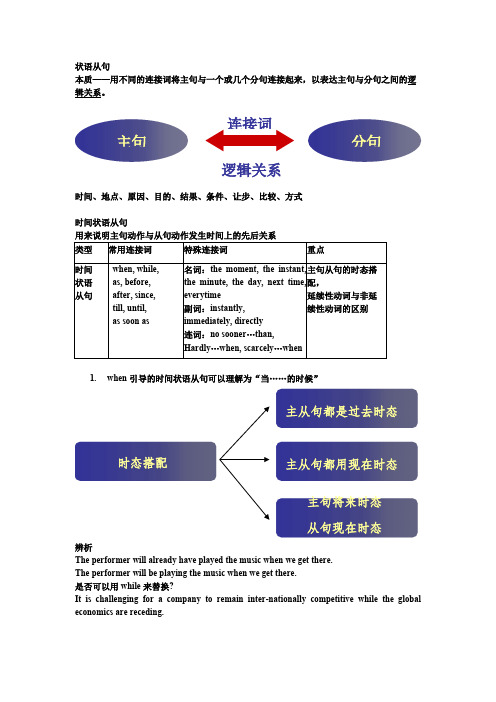
状语从句本质——用不同的连接词将主句与一个或几个分句连接起来,以表达主句与分句之间的逻辑关系。
主句分句连接词逻辑关系时间、地点、原因、目的、结果、条件、让步、比较、方式时间状语从句用来说明主句动作与从句动作发生时间上的先后关系类型常用连接词特殊连接词重点时间状语从句when, while, as, before,after, since, till, until,as soon as 名词:the moment, theinstant, the minute, theday, next time, everytime副词:instantly,immediately, directly 连词:no sooner …than,Hardly…when, scarcely …when 主句从句的时态搭配,延续性动词与非延续性动词的区别1. when 引导的时间状语从句可以理解为“当……的时候”时态搭配主从句都是过去时态主从句都用现在时态主句将来时态从句现在时态辨析The performer will already have played the music when we get there.The performer will be playing the music when we get there.是否可以用while 来替换?It is challenging for a company to remain inter-nationally competitive while the global economics are receding.※when, while, as 用法的区别when 相当于at that time ,引导的状语从句中谓语动词可以是延续性的也可以是非延续性的while ,as 相当于during that time, 引导的状语从句中谓语动词通常是延续性的随着英特网变得日益商业化,网络的使用对商人们非常有利。
状语从句

7.比较状语从句 由than、as…as引导。如: Jim is taller than me. 吉姆比我高。 Lucy jumps as far as Lily. 露茜和莉莉跳得一样远。 8.方式状语从句 由as、as if等引导。如: Please do as I do. 请像我这样做。 She lay down as if she was ill. 她躺着似乎是病了。 9.让步状语从句。 通常由though、although、even if、Whatever等 引导。如: There is air around us, though we can't see it. 我们周围都是空气,尽管我们看不到。
Байду номын сангаас
(改错)
《中考指导》
中考考点2: if表 “是否”引导宾语从句可用将来时. C 考题:I don’t know if he __. If he __ , I’ll tell you. A. will come, will come B. comes, will come C. will come, comes D. comes, come 《中考指导》 中考考点3: “祈使句 + and (or)+ 陈述句” 在意思上相 当 于一个带有条件状语从句的复合句。
中考考点3:※※※while从句用进行时 were readinng e.g.1) My parents _______________ (read) some newspapers while I ____________ (play) with my e-dog this was playing time yesterday.《中考指导》 2) While we ____________ (travel) in were travelling Australia last year, I visited Lucy who once taught English in our school. (上海市2004)
状语从句

状语从句
【让步状语从句】
语法导学
8.让步状语从句:
1)由though,although引导。
在句子中一般用了“虽然”就不能再用“但是”(but),但可 以与yet或still连用。though / although意义相同,用法基本一样, 前者通俗,口语化,后者正式,多放主句的前面。
如:
Although (Though) he was over sixty, (yet) he began to learn French.
【结果状语从句】
语法导学
5.结果状语从句:
2)由such…that引导。 such…that的such后面跟名词,如果名词是单数就 要用such a /an…that, 还可以转换用so…that,语气 较强。 如: It is such an interesting novel that all of us want to read it. = It is so interesting a novel that all of us want to read it.
【让步状语从句】
语法导学
8.让步状语从句:
3)由as引导。
as引出的状语从句多用于书面语,它比用though或although引导 的从句语气强,更有表现力,从句常放在句首,语序部分倒装。
如:
Child as he is , he knows a lot.
=Though/Although he is a child , he knows a lot.
状语从句
【让步状语从句】
语法导学
8.让步状语从句:
2)由even if,even though引导。
even if 和even though的意思为“即使”“纵使”有退一步设想 的意味, 多用于书面语中。
状语从句(9种全)
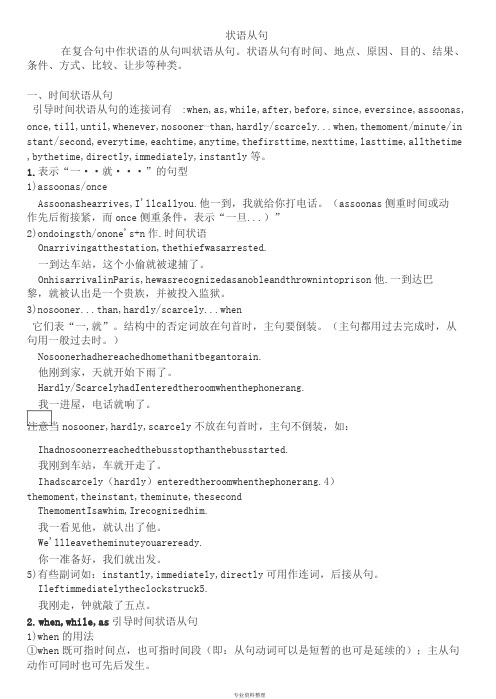
状语从句在复合句中作状语的从句叫状语从句。
状语从句有时间、地点、原因、目的、结果、条件、方式、比较、让步等种类。
一、时间状语从句引导时间状语从句的连接词有:when,as,while,after,before,since,eversince,assoonas, once,till,until,whenever,nosooner⋯than,hardly/scarcely...when,themoment/minute/in stant/second,everytime,eachtime,anytime,thefirsttime,nexttime,lasttime,allthetime ,bythetime,directly,immediately,instantly等。
1.表示“一··就···”的句型1)assoonas/onceAssoonashearrives,I'llcallyou.他一到,我就给你打电话。
(assoonas侧重时间或动作先后衔接紧,而once侧重条件,表示“一旦...)”2)ondoingsth/onone's+n作.时间状语Onarrivingatthestation,thethiefwasarrested.一到达车站,这个小偷就被逮捕了。
OnhisarrivalinParis,hewasrecognizedasanobleandthrownintoprison他.一到达巴黎,就被认出是一个贵族,并被投入监狱。
3)nosooner...than,hardly/scarcely...when它们表“一,就”。
结构中的否定词放在句首时,主句要倒装。
(主句都用过去完成时,从句用一般过去时。
)Nosoonerhadhereachedhomethanitbegantorain.他刚到家,天就开始下雨了。
Hardly/ScarcelyhadIenteredtheroomwhenthephonerang.我一进屋,电话就响了。
状语从句在复合句中起状语作用的从句叫状语从句。有的状语

名词(这时他们是介词):
She waited a little while before making up her mind. 她等一会儿才做出决定。
After sending you that letter I recollected how stupid I was. 把信寄给你之后我想起我多么愚蠢。
其中的一个。
(4) for 也常引导表示原因的分句,但 for是并列连词,因此不能用于句首;for 提供的理由是一种补充性的说明,且 for 前常有逗号:
The days are short, for it is now December. 白天短了,因为已是12月了。 (四) 目的状语从句
引导目的状语从句的连词:in order that, so that(为了);for fear that, in case, lest(以免)等。
作相并发生,常可译作“一边……一边”:
When he returned, his wife was cooking. 他回来时,他妻子在烧饭。
While he was reading(或read), his wife was cooking(或cooked). 他看书时,他妻子一直烧饭。
As he was reading(或read), he was listening(或listened) to the radio. 他边看书边听广播。
1、 because, since, as 都可表示“因为”。
(1) because 表示原因的语气最强, 通常回答以疑问词why 引导的问句,除 特别强调外,该从句一般位于主句后; since 表示稍加分析后而推断出来的原 因,比as 正式;as 表示对方已知道的原 因。since 和 as 不回答why 引导的疑问 句,而且其从句一般放在句首:
高中英语语法:状语从句知识点
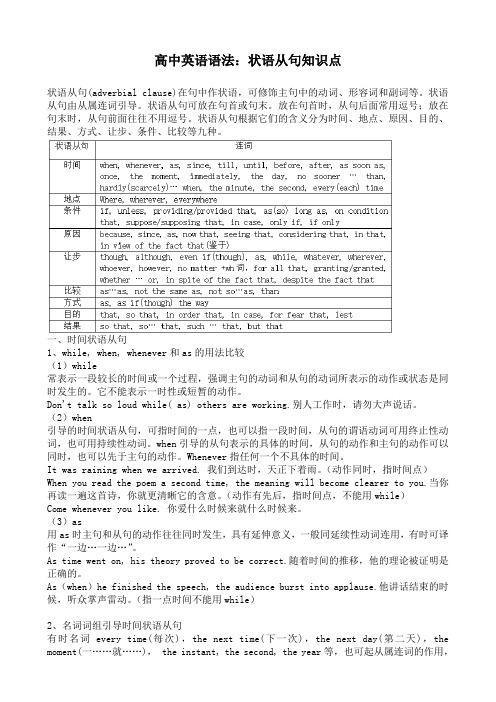
高中英语语法:状语从句知识点状语从句(adverbial clause)在句中作状语,可修饰主句中的动词、形容词和副词等。
状语从句由从属连词引导。
状语从句可放在句首或句末。
放在句首时,从句后面常用逗号;放在句末时,从句前面往往不用逗号。
状语从句根据它们的含义分为时间、地点、原因、目的、结果、方式、让步、条件、比较等九种。
一、时间状语从句1、while, when, whenever和as的用法比较(1)while常表示一段较长的时间或一个过程,强调主句的动词和从句的动词所表示的动作或状态是同时发生的。
它不能表示一时性或短暂的动作。
Don't talk so loud while( as) others are working.别人工作时,请勿大声说话。
(2)when引导的时间状语从句,可指时间的一点,也可以指一段时间,从句的谓语动词可用终止性动词,也可用持续性动词。
when引导的从句表示的具体的时间,从句的动作和主句的动作可以同时,也可以先于主句的动作。
Whenever指任何一个不具体的时间。
It was raining when we arrived. 我们到达时,天正下着雨。
(动作同时,指时间点)When you read the poem a second time, the meaning will become clearer to you.当你再读一遍这首诗,你就更清晰它的含意。
(动作有先后,指时间点,不能用while)Come whenever you like. 你爱什么时候来就什么时候来。
(3)as用as时主句和从句的动作往往同时发生,具有延伸意义,一般同延续性动词连用,有时可译作“一边…一边…”。
As time went on, his theory proved to be correct.随着时间的推移,他的理论被证明是正确的。
As(when)he finished the speech, the audience burst into applause.他讲话结束的时候,听众掌声雷动。
状语从句
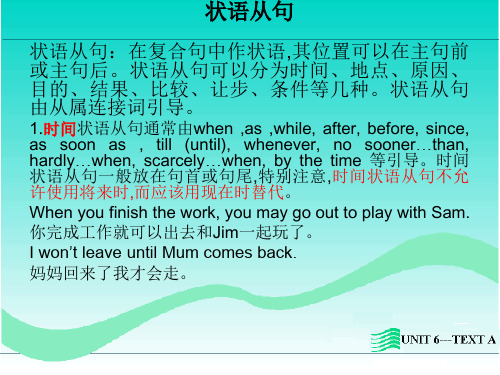
2.地点状语从句通常由 where, wherever, anywhere, everywhere等引导。如: Go back where you came from! 哪里来还滚到哪里去! I will never forget to catch the thief who stole my necklace wherever he may be. 我永远也不会忘记去抓住那个偷我项链的贼,无 论他会在哪里。
6.比较状语从句通常由as, than, as (so)...as等引导,一般省略从句的谓语部 分,只剩下名词或代词(用主格或宾格均 可)。如: Jane is much taller than I/me. Jane比我高多了。 I don’t have as many books as you (do). 我书没有你多
4. 目 的 状 语 从 句 通 常 由 so that..., in order that... 等引导,往往放在句尾,从句中通常含有 can / could / may / might等情态动词。如: He got up earlier so that he could catch the first train. 他起身更早为的是赶上第一班车。 Note: lest, for fear that, in case that引导的目 地状语从句用should + 动词原形。 He was punished lest he should make the same mistake again.
9.方式状语从句通常由as, as if, as though, the way引导. 1) as, (just) as…so…引导的方式状语从句 通常位于主句后,但在(just) as…so…结构中 位于句首,这时as从句带有比喻的含义,意 思是"正如…","就像",多用于正式文体,例 如: As water is to fish, so air is to man.我们离不 开空气,犹如鱼儿离不开水。 A is to B what C is to D. You must try to hold the tool as I do. 你必须像我这样拿工具。
状语从句

• Since, as语气较弱。
• since引导的从句一般放在句首: • Since I haven’t got her address, I can’t write to her. • as引导的从句既可放在主句之前,也可放 在主句之后。 • As you were out, I left a message. • 你不在,所以我留了张字条。 • She may need some help as she’s new. • 她是新来的,可能需要一些帮助。
2)while表示从句动作和主句动作同时发生,且持续 一段时间。因此,从句的谓语动词常常是延续性 动词。
While they sang,they danced.
While the children were watching TV,their parents were reading books. 3)as主要指从句和主句动作同时发生,从句的动作 持续时间较短,可译做“一边…一边…”; 有时也 可表示两个动作正在发展、变化,作“随着…”讲。
• no sooner…than, hardly/scarcely…when, 这几个句型主句 使用过去完成时,从句使用一般过去时,
• We had no sooner set out than it began to rain.
• no sooner, hardly,scarcely放在句首时, 主句谓语要倒装。 • Scarcely /Hardly had we set out when it began to rain.
3.原因状语从句:
引导原因状语从句的词或词组有: because,since,as,seeing (that), now (that), consider (that), in that, not that..., but that等
状语从句

• • • •
We must strike while the iron is hot. 我们应该趁热打铁。 When I was young, I liked dancing. 我年轻时喜欢跳舞。
•⑤从句的谓语动词如表示状态时,通 常用while,有时也用when。
• Mike is tall while his brother is short.迈克 的个子很高,然而他弟弟很矮。 • Lucy was on her way home when two girls stopped her.露西正走在回家的路上,这时 两个女孩拦住她。
•③当从句的谓语是表动作的延续性动词时, whe just as (or when) I reached the door.我刚到门那儿,他就来了。
•④当从句和主句的谓语动词都是终止性动词时, when可和as通用,而且用as比用when在时间上 更为紧凑,有"正当这时"的含义。
• (3) for 有时也可引出表示原因的分句,但它 只能位于后面,对前一分句加以解释或推 断。 • (4) 不要受汉语意思影响将表示“因为”的 连词与表示“所以”的 so 连用。
六、地点状语从句
• 引导地点状语从句的从属连词主要有where (在…的地方), wherever(无论什么地方), everywhere(每个…地方), anywhere(任 何…地方)。如: • I‟m not living where I was. • 我不在原处住了。
•⑥while和when都可以用作并列连词。
• while从句中的谓语动词必须是延续性动词; • 表示带有规律性的“每当”或当主、从句 谓语动词的动作发生有先后时,只能用 when; • 当表示“一边…一边…”或“随着”时用 as。 另外,用于此义的 as 所引导的时间状语从 句谓语只能是动作动词,不能是状态动词。
完整版)状语从句(9种全)

完整版)状语从句(9种全)状语从句在复合句中起到修饰主句的作用,分为时间、地点、原因、目的、结果、条件、方式、比较、让步等种类。
1.时间状语从句时间状语从句的连接词包括when。
as。
while。
after。
before。
since。
ever since。
as soon as。
once。
till。
until。
whenever。
no sooner…than。
hardly/scarcely。
when。
the moment/minute/instant/second。
every time。
each time。
any time。
the first time。
next time。
last time。
all the time。
by the time。
directly。
immediately。
instantly等。
例如,“一···就···”的句型可以用as soon as或once引导,其中as soon as侧重时间或动作先后衔接紧,而once侧重条件,表示“一旦。
”;on doing sth/on one's + n.作时间状语,例如On arriving at the n。
the thief was arrested.意为“一到达车站,这个小偷就被逮捕了。
”2.地点状语从句地点状语从句的连接词包括where。
wherever。
anywhere。
everywhere等。
例如,I'll go wherever you go.意为“你去哪儿,我就跟你去哪儿。
”3.原因状语从句原因状语从句的连接词包括because。
since。
as。
now that。
seeing that。
considering that等。
例如,Since it's raining。
we'll stay indoors.意为“因为下雨,我们将待在室内。
状语从句的讲解最全的状语从句讲解
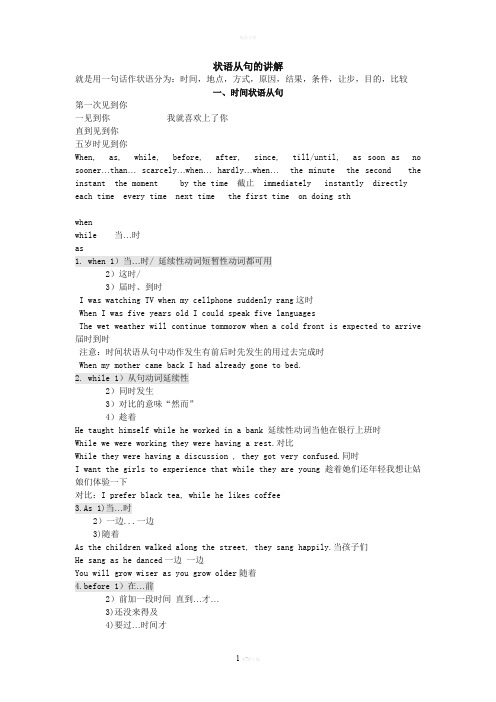
状语从句的讲解就是用一句话作状语分为:时间,地点,方式,原因,结果,条件,让步,目的,比较一、时间状语从句第一次见到你一见到你我就喜欢上了你直到见到你五岁时见到你When, as, while, before, after, since, till/until, as soon as no sooner…than…scarcely…when…hardly…when…the minute the second the instant the moment by the time 截止 immediately instantly directly each time every time next time the first time on doing sthwhenwhile 当…时as1. when 1)当…时/ 延续性动词短暂性动词都可用2)这时/3)届时、到时I was watching TV when my cellphone suddenly rang这时When I was five years old I could speak five languagesThe wet weather will continue tommorow when a cold front is expected to arrive 届时到时注意:时间状语从句中动作发生有前后时先发生的用过去完成时When my mother came back I had already gone to bed.2. while 1)从句动词延续性2)同时发生3)对比的意味“然而”4)趁着He taught himself while he worked in a bank 延续性动词当他在银行上班时While we were working they were having a rest.对比While they were having a discussion , they got very confused.同时I want the girls to experience that while they are young趁着她们还年轻我想让姑娘们体验一下对比:I prefer black tea, while he likes coffee3.As 1)当…时2)一边...一边3)随着As the children walked along the street, they sang happily.当孩子们He sang as he danced一边一边You will grow wiser as you grow older随着4.before 1)在…前2)前加一段时间直到…才…3)还没来得及4)要过…时间才I’ll be back before you leaveIt may be many years before we meet again 可能要过很多年我们才能见面The students rushed outside before I could finished my word 还没等我讲完It will be three weeks before he finished his workIt won’t be long before he finished his work. 用不了多久5.afterAfter my friend got married, she went to live in America6.since 自从主句一般为现在完成时We’ve never met since we graduated from the collegeGreat changes have taken place since you left7.till/untill肯定句中可互换直到…为止否定句中只用not…until…直到…才Not until 放句首句子部分倒装(倒装主句)Donald will remain in college until/till he finished his PhD course Donald won’t leave college until he finished his PhD courseI won’t go with you until I finished my homeworkNot until my mother came back did I go to bed8.as soon asI gave the alarm as soon as I saw the smoke.一看见冒烟就发出警报He will be set free as soon as the fine is paid9.the minuteThe secondThe instant瞬间片刻立即的立刻的素食的The momentThe minute we got home, the telephone rang10. no sooner…than…Scarcely…when…Hardly…when…I had no sooner got home than it began to rain.The fans had hardly seen the movie star when they criedThe fans had scarcely seen the movie star when they cried注意:他们提前句子部分倒装No sooner had I got home than it began to rain.Hardly had I got home when it began to rainScarcely had the fans seen the movie star when they cried11.名词引导的时间状语从句The first time I saw you I mistook you for a film starNext time I see you I will tell you the truthEvery time/each time I see this picture I think of my hometown.12. On+ doing 一…就…On arriving home, he discovered they had gone 一到家发现他们已经走了13.immediately instantly directlyImmediately she had gone, I remembered her name.她刚走开我就想起了她的名字14.by the time 1)从句是一般现在时主句用将来完成时2)从句是一般过去时主句用过去完成时By the time you receive this letter, I will have left this cityI shall have finished it by the time you come back 你回来以前我就做完了By the time I got there, the bus had already left.注意:as soon as after before 常与过去完成时连用After I had finished my homework I went to sleepBefore I went to sleep I had finished my homeworkAs soon as I had finished my homework I went ot sleep.但是如果不强调时间的先后都可以用一般过去时After I finished my homework I went to sleep/二、地点状语从句一、Where在…地方 wherever无论哪里 anywhere任何地方 everywhere到处1.whereYou should put the book where you found itWe must camp where we can find waterYou had better make a mark where you have any questions.2.whereverwherever there is smoke, there is fireplease put the cup wherever that is convinient3.anywhereYou can put it anywhere you likeI can’t stay anywhere there are a lot of people4.everywhereEverywhere I go, I find the same thing.去到的每一处都看到同样的情况I have searched everywhere there is a clue二、与定语从句的区别1.定语从句中where是关系副词在从句中充当状语前面有表示地点的名词状语从句中where是从属连词引导的从句修饰主句的谓语动词整个句子做状语前面无先行词Bamboo grows best in places where it is warm and where it rains often.Bamboo grows best where it is warm and where it rains often.Go back where you came fromGo back to the place where you came2.where 引导的状从可放在句首与句末都可而where 引导的定语从句只放在句末三、练习1.he advised me to live_______ the air is fresherA. in whereB.in whichC. the place whereD. where2. in peace too, the Red Cross is expected to send help _______ there is human sufferingA. whoeverB.howeverC. whateverD.wherever3. if you are travelling____the customs are really foreign to you own . please doas the Romans doA. in whichB. whatC. whenD. where三、原因状语从句Because since for as now that in that because of 既然鉴于 in as much as既然鉴于in so far as鉴于考虑到considering that seeing that given thatFor the reason that 由于…原因 due to the fact that 由于…事实 owing to the fact that1.because 1)语气最强常放句末2)回答why 的问句3)强调句I missed the train because I got up late.He is disappointed because he failed againBecause he failed again so he is disappointed错不能出现so注意;because 前可以加程度副词 simply because just merely mainlyIt is because she is too inexperienced that she does not know how to deal with the situation2.since 语气弱一些表示对方已知的已经存在的原因“既然”常常放句首Since you are not interested, I won’t tell you about itSince no one is against it, we will pass it 通过了3.as “由于’表示较为明显的原因常放句首As it is snowing, you’d better take a taxiAs you request it , I will come4.for 1)表示猜测的原因放句末用逗号隔开2)多用于书面语不表示直接原因对前面的句子附带说明It must have rained last night, for the ground is wetI went to see him, for I had something to tell him.I want to be an engineer,for it’s my dream5.now that 既然=since表示新出现的情况促成某事的发生放句首居多已经有的情况目前的状况Steven, I heard that the flight ticket to America is cheap recently . Now that you have time, whynot we go there together.Now that we can’t change the fact, let’s accept it.6. in that仅因为就因为有限制意味多用于否定中Some old people only remember happy things in that they can’t get used to this fast societyI don’t like sports in that I am good at it7. in as much as in so far as既然鉴于In so far as it is not my fault, I don’t care.In as much as the debtor has no property, I abandon my claim8.considering that 考虑到鉴于补充说明She knows quite a lot about it, considering (that) she is very young. Considering that she is just a child, I am not very strict with her9.seeing that由于因为鉴于已有情况Seeing that he’s been sick all week, he is unlikely to come today.Seeing that you live next door to Mr Black, you should recognize her.10. for the reason that 很正式的书面表达Due to the fact thatOwing to the fact thatI left that country due to the fact that I can’t accept its cultureFor the reason thatOwing to the fact that11. given that 由于鉴于Given that you are new here, I will show you around.四、条件状语从句一、If unless=if not if only as long as = so long as on condition (that) in case假如以防万一provided (that) = providing (that) suppose (that) = supposing (that) once 1. if 如果1)真实条件句2)非真实条件句(虚拟语气)If it doesn’t rain we will go climbingIf you have any question, you can voice them now. 可以提出来主将从先主情从现If I were a bird, I would fly2.unless=if notYou will be late, unless you hurry= You’ll be late, if you don’t hurryIf you don’t visit him tomorrow, he will be angry= Unless you visit him tomorrow he’ll be angryI won’t forgive you unless you apologize= I won’t forgive you, If you don’t apologize3.if only 只要如果要是…就好了I’ll let you use my car, if only you return it省略主句用虚拟If only he knew English4.in caseTake a coat in case the weather turns cold 主祈使从现In case I forget, please remind me about it如果我忘了请提醒我I’ll give you my phone number in case you want to contact me 主将从现注意:in case of+ 名词表条件以防 in that case在那种情况下In case of rain they can’t go to the park 万一下雨他们就不能去公园了In that case, he would be punished情况如此他就会收到惩罚5.as long as= so long as只要如果主将从现主情从现As long as it doesn’t rain, we can go to playAs long as/so long as we don’t lose heart, we’ll find a way to overcome the difficulty You can go to see the film as/so long as you arrive on time 只要你按时到你就能去看这场电影注意:as long as 还有…之久的意思You can keep it as long as you can = You can keep it as long as possible你可以尽量久地保留它6.on conditiong that 条件是只要I’ll come on conditon that Amy is invited too我可以来条件是艾米也被邀请了7.provided (that)= providing (that)Providing there is no objection, we shall make a decisionHe won’t be against us in the meeting provided (that) we ask for his advice只要我们征求他的意见8.suppose (that)=supposing (that) 假如假设Supposing it rains, shall we visit the museum?Suppose that you are a famous writer, do you like to write such a book?9.onceI’ll make friends once I’m settled in Paris.二、时态的一致1.时间状语从句和条件状语从句中遵从主将从现主情从现主祈使从现He’ll be a doctor when he finishes studying here.If it doesn’t rain tomorrow, we’ll start出发If you get the book, let me know.If you like, you can stay here for the weekend.在这里过周末If you drink, don’t drive2.如果谓语是want hope 等动词,则条件状从一般用一般现在时What do you want to do if you have much money?I hope to see her if I’m free3.有些句子中主从句都用一般现在时If you ring this number, no one answersIf you press the switch, the computer comes on如果你按这个开关计算机就会启动4.条件状从中也可用的will表示意愿If you won’t go, you needn’t go/won’t go 如果你不愿意去,那就不去If you’ll just wait a moment, I’ll find someone to help you 如果你愿意等一会我会找人帮你五、目的状语从句So that in order that lest以免 for fear that 唯恐 so that in case 以免1.so that为了I spoke slowly so that you could understand me.2.in order that 为了She raised her voice in order that she might be heard= she raised her voice so that she might be heard注意:in order that 与so that 可以改为不定式做目的状语= in order to do so as to do to doShe raised her voice so as to be heard 因为so as to do 不可以放句首In order to be heard she raised her voice = she raised her voice in order to be heard To be heard she raised her voice = she raised her voice to be heard3.lest 以防常用于虚拟语气 lest sb (should) doI wrote down the date of his birthday lest I should forget itI was afraid to open the door lest he should follow me4.for fear (that)常与虚拟连用 for fear that sb should/may/might doShut the window for fear that it may rainHe took an umbrella with him for fear that it might rain5.in caseHe took a gun in case he met any wild animals 他带上枪以防遇到野兽6. so 这样为了Come to my house so I could tell you all about itHe wrote the Bible in Enlish so all could read it7.thatLet’s take the front seats that we may see more clearly.六、结果状语从句一、So…that such…that so that that so1. so…that 如此以至于中间加形容词和副词He worked so hard that he passed the exam副词They were so excited that they cried out 如此激动以至于大喊大叫形容词注意:1)So 位于句首句子倒装He was injured so badly that he had to be sent to the hospital.So badly was he injured that he had to be sent to the hospitalThe novel was so boring that he gave up reading itSo boring was the novel that he gave up reading it2)如果结果状从是否定可以替换成too…to..句型David was so careless that he didn’t find the mistakes in his test paper. David was too careless to find the mistakes in his test paper.2.such…that 加名词He was such a fool that he made a terrible mistakeThis book is written in such easy English that even little children can understand it.注意:such 位于句首倒装Such a good boy is he that we all love him注意:当有形容词的时候1)中间加单数可数名词it gave him such a shock that his face turned white 使他如此震惊以至于他的脸都白了This is such a useful dictionary that I’m thinking of buying itThis is so useful a dictionary that I’m thinking of buying itHe is such a clever boy that all the teachers like himHe is so clever a boy that all the teachers like him2) 中间加不可数名词只用such对He showed such concern that people took him to be a friend他展示出如此的关心人们都把他当朋友了错He showed so concern that people took him to be a friend对It is such nice weather that all of us want to go to the park错It is so nice weather that all of us want to go to the park3).中间是负数可数名词They are such difficult problems that I don’t know how to settle them.He made such a lot of mistakes that he had to give upThey are such fine teachers that we all respect them4)中间是much little many few 时Such a little boy has so little difficulty in working out this difficult problem that I admire him very much 这样小的孩子解这道题遇到如此少的困难我很羡慕他He had so much work to do that he had to work late into the nightThere are so few notebooks the I can’t give you any 笔记本太少以至于我一本也不能给你There are many kinds of bikes that I don’t know which to buy5) such= so + adjHis voice is such that we can’t bear it3.so thatHe worked hard so that he passed the examI stayed up late last night so that I feel sleepy now4.that 以至于The weather is terribly hot that I want to have a shower three times a day5.so 以至于结果He played computer games every day so he failed the final exam二、so that 即引导目的状语从句也引导结果状语从句目的为了结果以至于结果…目的状从中常和 can could may might will would 等情态动词连用The little boy saved every coin so that he could buy his mother a present能够买The little boy saved every coin so that he bought his mother a present,每一枚硬币结果买了He always studied hard so that he may make great progress这样他才可以取得(目的)He always studied hard so that he made great progress结果他取得了很大进步七、让步状语从句Though Although Even if Even though as while However+adj/adv= no matter howWhatever= no matter what whoever= no matter who whomever=no matter whom Whichever=no matter which wherever=no matter where whenever=no matter when Despite in spite of1.although=though 尽管虽然它们不可以与but 连用但是可以与yet still连用Although/though he is tired, he (still) keeps on working hard2. as Though 用倒装表示让步尽管虽然1).倒装名词Although/though he is a child, he can speak five languagesChild though/as he is, he can speak five languages2)倒装副词Although/though he works hard, he makes little progressHard though/as he works, he makes little progress3)倒装动词Although/though you may object, I’ll carry out the experiment.Object though/as you may, I’ll carry out the experiment.4)倒装形容词Tired though/as he is, he (still) keeps on working hardAmazing as it may seem Wednesday night was a quiet night.3.while尽管虽然While I understand your point of view, I do not share it尽管我理解你的观点但是我不苟同4.even if even though 即使尽管语气比although though 强烈We’ll make a trip even if/even though the weather is bad. 即使天气不好我们也要做一次旅行You should try to be nice to him, even though you don’t like him 尽量对他好Even though/ Even if it is raining, I’ll go to work 尽管下雨我也要去上班注意:Even if 与even though可用于虚拟语气中Even if/Even though I were ill, I would attend the meeting即便是我生病我也要去参加会议Even if/Even though I am ill, I will attend the meeting即使我生病了我也要参加会议5.despite 尽管 = in spite of + 名词引状语Despite I miss him, I refused to call himIn spite of him illness, he still went to see his girlfriend.6.however + adj/adv = no matter how+ adj/adv 无论怎么尽管No matter how difficult the problem may be, we will overcome it.However difficult the problem may be, we will overcome it.No matter how/ However fast you can run, you still can’t catch up with him7.no matter which= whichever无论哪个No matter which/whichever you like best, you have. 无论你喜欢哪个你都可以拥有8.no matter who=whoever 无论谁No matter who/ whoever you are, you must obey the law9.no matter when= whenever 无论何时No matter when/whenever she comes, she says the same words无论她什么时候来她都说同样话10.no matter whom=whomever无论谁Whomever/ No matter whom you ask, you will not get the answer11.no matter where/wherever 无论哪里No matter where he goes, he always carry his suitcase手提箱12.no matter what=whatever 无论什么No matter what do, I will support you注意:whatever系列可以引导宾从 no matter 系列不可以对You can buy whatever you like错You can buy no matter what you like八、方式状语从句一、用法As if as though just as as tht way in the way (in) the same way just as…so… like1.like 像…He looked like he had seen a ghost他看起来好像见了鬼似的You talked just like your father does(省略谓语)2.as if / as though似乎好像She acts as though she owns the placeShe treats him as if he was her own son 他对待他就像自己的亲生儿子一样3.just as 就像I finished the work just as you told me4. as 就像He must do as the doctor advised 他必须按照医生说的去做When in Rome do as the Romans do5.just as…so…就像Just as you sow, so shall you reapJust as some people like sports, so some people like music正如有些人喜欢体育有些人喜欢音乐6.the way …方式You should operate the machine the way you were told 用你被告知的方式去操作这台机器7.in the wayWe must solve this problem in the way that we want it to我们必须按照我们想要方式解决问题8.(in) the same wayHe is behaving (in) the same way his father used to 他的行为和他父亲过去的行为一样二、特殊情况1. as if/ as though 引导的让步从句可用于虚拟He acted as if he were brave他表现的似乎很勇敢(与事实不符)It looks as if it’s going to rain 看上去好像要下雨了(与事实相符)It sounds as though the situation would get worse.听起来好像情况会恶化似的(与将来事实不符2.从句的省略(当主从句的主语一致时)He looked at me as if he were madHe looked at me as if mad但是He looked at me as if I were mad不可以改He rushed outside as if he is to cryHe rushed outside as if to cryHe lay on ground as if he were deadHe lay on ground as if deadHe always knows everything as if he does it by instinctHe always knows everything as if by instinct九、比较状语从句一、用法As…as not as/so…as more…than less than the more…the more more and more no more than not more than1.as…asHe speaks English as fluently as his brother (does)2.not as/so…asI can’t jump so/as high as he (does)I’m not as pretty as my sister (is)3.more thanHe speaks English more fluently than his brother(does)Don’t carry more books than we need4.less …thanJoseph is less honest than his brother (is honest)5.the more…the more 越…就越…The more you eat, the fatter you areThe more you do, the less pleased he is二、特殊用法more than1. more than 放数词前“超过;不止;以上”= overMore than 70 percent of the surface of our planet is covered by water.我们这个星球表面有 70% 以上都为水所覆盖2. more than 放名词前“不只是;不仅仅”Hibernation is more than sleep. 冬眠不仅仅是睡眠。
九种英语状语从句

状语从句的种类(九种)口诀:▪时地原因条状补,▪目比结果方让步,▪连词引导各不同;▪主句通常前面走,▪连词引导紧随后,▪从句若在主前头,▪主从之间有个逗。
用来修饰谓语动词、其它动词、定语、状语或整个句子的从句叫做状语从句。
状语从句可分为:1.时间状语从句;(adverbial clause of time)2.地点状语从句;(adverbial clause of place)3.原因状语从句;(adverbial clause of cause)4.条件状语从句;(adverbial clause of condition)5.目的状语从句;(adverbial clause of purpose)6.让步状语从句;(adverbial clause of concession)7.比较状语从句;(adverbial clause of comparison)8.方式状语从句;(adverbial clause of manner)9.结果状语从句。
(adverbial clause of result)§状语从句的时态特点一般情况下,时间和条件状语从句的谓语动词一般用“一般现在时”表示“一般将来时”,用“现在完成时”表示“将来完成时”。
例如:1.时间状语从句;(adverbial clause of time)①由when, while, as引导的时间状语从句。
例如:When we got home, I find Tom.While my wife was reading the newspaper, I was watching TV.We always sing as we walk.我们总是边走边唱。
②由before和after引导的时间状语从句。
It will be four days before they come back. 他们要过四天才能回来。
After you think it over, please let me know what you decide.你仔细考虑过以后,告诉我你是怎样决定的。
状语从句的9种形式

状语从句的9种形式状语从句是一种在句子中作状语的从句,它有9种形式:时间、地点、原因、条件、方式、让步、结果、比较和目的。
一、时间状语从句时间状语从句用来表示句子发生的时间,一般要用when或while引导:When I was a child, I used to play with my friends every day. 我小时候每天都和朋友玩耍。
While I was studying in the library, someone stole my bag. 我在图书馆学习时,有人偷了我的书包。
注意:在某些情况下,when和while可以互换使用,但不能混用。
二、地点状语从句地点状语从句表示句子发生的地点,一般要用where 引导:Where there is a will, there is a way. 有志者事竟成。
He lives where he works. 他住在他工作的地方。
三、原因状语从句原因状语从句表示句子发生的原因,一般要用why或because引导:Why she is late? 她为什么迟到?Because it was raining heavily, I couldn't get to school on time. 因为下着大雨,我上不了学。
四、条件状语从句条件状语从句表示句子发生的条件,一般要用if或unless引导:If you study hard, you'll pass the exam. 如果你努力学习,你就能通过考试。
Unless you work harder, you won't get better grades. 除非你更努力工作,否则你的分数不会提高。
五、方式状语从句方式状语从句表示句子的发生方式,一般要用as或how引导:As I said before, I'll help you with your project. 就像我之前说的,我会帮助你完成这个项目。
状语从句(原因,目的,时间,地点)【精选】

状语从句 本质——用不同的连接词将主句与一个或几个分句连接起来,以表达主句与分句之间的逻辑关系。
时间、地点、原因、目的、结果、条件、让步、比较、方式时间状语从句用来说明主句动作与从句动作发生时间上的先后关系1. when 引导的时间状语从句可以理解为“当……的时候”辨析The performer will already have played the music when we get there.The performer will be playing the music when we get there.是否可以用while 来替换?It is challenging for a company to remain inter-nationally competitive while the global economics are receding.主句分句 连接词逻辑关系时态搭配 主从句都是过去时态主从句都用现在时态主句将来时态从句现在时态※when, while, as 用法的区别when 相当于at that time ,引导的状语从句中谓语动词可以是延续性的也可以是非延续性的 while ,as 相当于during that time, 引导的状语从句中谓语动词通常是延续性的随着英特网变得日益商业化,网络的使用对商人们非常有利。
As the Internet becomes more and more commercialized, it is in the interest of business to universalize access.公司很难在经济衰退的环境下保持自身的国际竞争力。
It is challenging that commercial organizations remain globally competitive, while the economics is receding.2. before, after 引导的时间状语从句before 可理解为在……之前,after 可理解为在……之后主从句时态可明显体现动作的先后顺序We should do everything for what we want before it is getting too late.He had never gambled before the casino sent him a coupon for 20 dollars worth of gambling.3. since ,until 引导的时间状语从句(1)since从句中的非延续性动词可以表示一个时间点。
英语语法:状语从句的多种种类介绍

【导语】状语从句修饰主句/主句的谓语。
⼀般有九⼤类:表⽰时间、地点、原因、⽬的、结果、条件、让步、⽐较和⽅式等。
®⽆忧考⽹整理了相关内容,快来看看吧!希望能帮助到你~更多相关讯息请关注®⽆忧考⽹! 1、时间状语从句 常⽤引导词: when, as, while, as soon as, while, before, after, since , till, until 特殊引导词: the minute, the moment, the second, every time, the day,the instant, immediately , directly, no sooner …than, hardly …when, scarcely …when I didn't realize how special my mother was until I became an adult. While John was watching TV, his wife was cooking. The children ran away from the orchard (果园) the moment they saw the guard. No sooner had I arrived home than it began to rain. Every time I listen to your advice, I get into trouble. 2、地点状语从句 常⽤引导词: where 特殊引导词: wherever, anywhere, everywhere Generally, air will be heavily polluted where there are factories. Wherever you go, you should work hard. 3、原因状语从句 常⽤引导词: because, since, as, for 特殊引导词:seeing that, now that, in that, considering that, given that, considering that, as much as, so much as My friends dislike me because I'm handsome and successful. Now that everybody has come, let's begin our conference. The higher income tax is harmful in that it may discourage people from trying to earn more. Considering that he is no more than 12 years old, his height of 1.80 m is quite remarkable. 4、⽬的状语从句 常⽤引导词: so that, in order that 特殊引导词: lest, in case, for fear that,in the hope that, for the purpose that, to the end that The boss asked the secretary to hurry up with the letters so that he could sign them. The teacher raised his voice on purpose that the students in the back could hear more clearly. 5、结果状语从句 常⽤引导词: so that, so…that, such …that, 特殊引导词: such that, to the degree that, to the extent that, to such a degree that, He got up so early that he caught the first bus. It's such a good chance that we must not miss it. To such an degree was he excited that he couldn't sleep last night. 6、条件状语从句 常⽤引导词: if, unless, 特殊引导词: as/so long as, only if, providing/provided that, suppose that, in case that, on condition that We'll start our project if the president agrees. You will certainly succeed so long as you keep on trying. Provided that there is no opposition, we shall hold the meeting here. 7、让步状语从句 常⽤引导词: though, although, even if, even though 特殊引导词: as(⽤在让步状语从句中必须要倒装),while ( ⼀般⽤在句⾸),no matter …, in spite of the fact that, while, whatever, whoever, wherever, whenever, however, whichever Much as I respect him, I can't agree to his proposal. 尽管我很尊敬他, 我却不同意他的建议。
状语从句完整版

8. 祈使句+ and / or…. 1) Study hard , and you will succeed. 2) Don’t move, or I will fire. 归纳: 动词原形开头,and 或or 后多用will do
as soon as引导的时间状语从句
◆
as soon as 引导的时间状语从句,译为“一…就…”, 例句:他一回来我就告诉他这件事。 I will tell him about it as soon as he comes back.
2) …had done ………… + before + …did…….
3) …did……….. + before + … did…. 4) …do………+ before + …. do..
2. since 1)It is / has been 3 years since he left there.
after, until/ till, as soon as, since, the moment, immediately等。
when引导的时间状语从句
when意为“当……时”,引导时间状语从句, 表示主句的动作和从句的动作同时或先后发 生。 When he knocked at the door, I was sleeping. when引导的时间状语从句中的动词可以是终 止性的,也可以是延续性的 。 He was working at the table when I went in. I worked for a foreign company when I was in Shanghai.
I’ll give him your message the minute he arrives.
九大状语从句记忆口诀
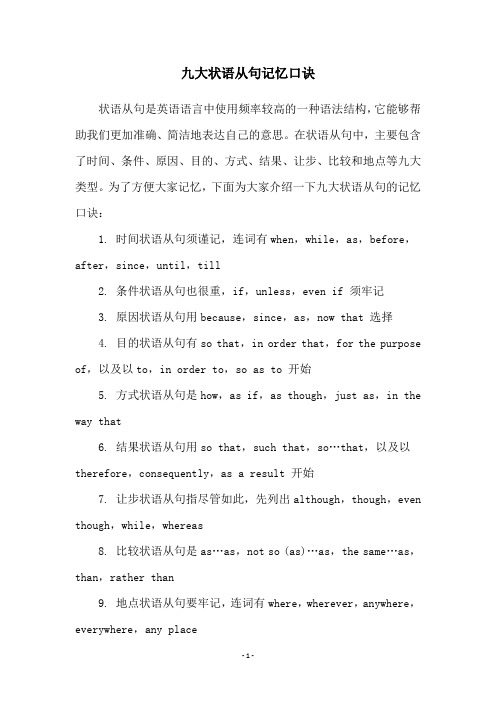
九大状语从句记忆口诀
状语从句是英语语言中使用频率较高的一种语法结构,它能够帮助我们更加准确、简洁地表达自己的意思。
在状语从句中,主要包含了时间、条件、原因、目的、方式、结果、让步、比较和地点等九大类型。
为了方便大家记忆,下面为大家介绍一下九大状语从句的记忆口诀:
1. 时间状语从句须谨记,连词有when,while,as,before,after,since,until,till
2. 条件状语从句也很重,if,unless,even if 须牢记
3. 原因状语从句用because,since,as,now that 选择
4. 目的状语从句有so that,in order that,for the purpose of,以及以to,in order to,so as to 开始
5. 方式状语从句是how,as if,as though,just as,in the way that
6. 结果状语从句用so that,such that,so…that,以及以therefore,consequently,as a result 开始
7. 让步状语从句指尽管如此,先列出although,though,even though,while,whereas
8. 比较状语从句是as…as,not so (as)…as,the same…as,than,rather than
9. 地点状语从句要牢记,连词有where,wherever,anywhere,everywhere,any place
以上就是九大状语从句的记忆口诀,希望能够帮助大家更好地记忆和掌握这一语法结构,从而提高自己的英语表达能力。
- 1、下载文档前请自行甄别文档内容的完整性,平台不提供额外的编辑、内容补充、找答案等附加服务。
- 2、"仅部分预览"的文档,不可在线预览部分如存在完整性等问题,可反馈申请退款(可完整预览的文档不适用该条件!)。
- 3、如文档侵犯您的权益,请联系客服反馈,我们会尽快为您处理(人工客服工作时间:9:00-18:30)。
时间状语从句
状语从句指句子用作状语时,起副词作用的句子。
它可以修饰谓语、非谓语动词、定语、状语或整个句子。
根据其作用可分为时间、地点、原因、条件、目的、结果、让步、方式和比较等从句。
状语从句一般由连词(从属连词)引导,也可以由词组引起。
从句位于句首或句中时通常用逗号与主句隔开,位于句尾时可以不用逗号隔开。
时间状语从句考点聚焦
(1)as、when、while用法
as表示“当……的时候”,往往和when/ while通用,但它着重强调主句与从句的动作或事情同时或几乎同时发生。
She came up as I was cooking.(同时)
The runners started as the gun went off.(几乎同时)
when:(at or during the time that )既可以表示在某一点的时候,又可表示在某一段时间内,主句与从句的动作或事情可以同时发生也可以先后发生。
It was raining when we arrived.(指时间点)
When we were at school, we went to the library every day.(在一段时间内)
while意思是“当……的时候”或“在某一段时间里”。
主句中的动作或事情在从句中的动作或事情的进展过程中发生,从句中的动词一般要用延续性动词。
在when表示a period of time时,两者可以互换。
Please don’t talk so loud while others are working.
He fell asleep while/when reading. Strike while the iron is hot.(用as或when不可,这里的while意思是“趁……”)
(2)引导时间状语从句的连接词除上述外还有:
①till, not … until …, until, before, since
Don’t get off the bus until it has stopped.
He waited for his father until(till)it was twelve o’clock.
It will be five years before he returns from England.
②hardly / scarcely … when, no sooner … than, as soon as once
表示“一……就”
As soon as I have finished it , I’ll give yu a call.
Once you show any fear, he will attack you.
We had hardly got / Hardly had we got into the country when it
began to rain.
No sooner had he arrived / He had no sooner arrived than she started complaining.
③directly, immediately, the moment, the minute that… 一……就
He made for the door directly he heard the knock.
④each time, every time, by the time
Each time he came to my city, he would call on me.
注意:表示未来情况,主句用将来时,从句用现在时。
让步状语从句
状语从句指句子用作状语时,起副词作用的句子。
它可以修饰谓语、非谓语动词、定语、状语或整个句子。
根据其作用可分为时间、地点、原因、条件、目的、结果、让步、方式和比较等从句。
状语从句一般由连词(从属连词)引导,也可以由词组引起。
从句位于句首或句中时通常用逗号与主句隔开,位于句尾时可以不用逗号隔开。
引导让步状语从句考点聚焦
(1)although与though可以引导让步状语从句,不能与but连用,但可以与yet连用。
Although they are poor,(yet)they are warm-hearted.
(2)even if或even though引导让步状语从句,表示“即使”,“纵然”,用来使人注意下文所强调内容的性质。
I’ll get there even if(though)I have to sell my house to get enough money to go by air.
(3)no matter后接上who、what、where、how等疑问词,也可以在这类疑问词后面加上ever构成whoever、whatever、wherever、however等。
Don’t trust him, no matter what / whatever he says.
Whoever breaks the law will be published.
No matter how hard the work is, you’d better try to do it well.
(4)as也可以引导让步状语从句。
要用倒装。
Child as(though)he is, he knows a lot.
Much as I like it, I won’t buy.
Try as he would, he couldn’t lift the heavy box.
原因状语从句
原因状语从句考点聚焦
because, for, as, since, now that
(1)表示不知道的原因时用because,即说话人认为听话人不知道,因此because从句是全句最重要的部分,通常它被置于主句之后。
You want to know why I’m leaving? I’m leaving because I’m full.
for虽然表示不知道的原因,但其语气较because要弱得多,是可说可不说的话,它只能置于主句之后,这时,for是并列连词。
如果不是因果关系,而是对前面主句的内容加以解释或推断时,只能用for。
如:It’s morning now, for the birds are singing.(很显然,鸟叫不可能是“现在已是早上”的原因。
)
(20表示已经知道的原因时用as或since,即某种原因在说话人看来已经很明显,或已为听话人所熟悉,因此它是句中不很重要的部分。
since要比as正式一些,它们通常被置于语句之前,但有时却相反。
Seeing all of the child ren already seated, he said,“Since everyone is here, let’s start.”
(3)下列情况下只能使用because:
①在回答why的问句时;
②在用于强调句型时;
③被not所否定时。
地点状语从句
1、地点状语从句考点聚焦
where, wherever
Make a mark wherever you have any questions.
We will go where the Party directs us.
2、目的状语从句:that, so that, in order that
注意:目的状语从句的谓语动词常与情态动词连用,否则可能是结果状语从句。
不可置于句首。
3、结果状语从句:that, so that, so … that, such … that …
注意:so + 形容词/副词+ that从句;such +名词+ that从句。
4、方式状语从句:as, as if(though)
I’ll do as I am told to.
It looks as if it is going to rain.
5、比较状语从句:than, as
6、条件状语从句:if, unless, so (as)long as, in case, once, a far as, on condition that.
注意if与unless的区别:不能用and连接两个unless从句,即不能有… unless …,and unless … 。
但if … not and if … not却不受此限。
You won’t lose your weight unless you eat less and unless you exercise more.(×)
但可以说… unless you eat less and exercise more.
7、注意状语从句中从句的省略现象
(1)连接词+ 过去分词
Don’t speak until spoken to.
Pressure can be incrased when needed.
Unless repaired, the washing machine is no use.
(2)连词+现在分词
Look out while crossing the street.
(3)连词+ 形容词/其他
常见的有it necessary、if possible、when necessary、if any等。
